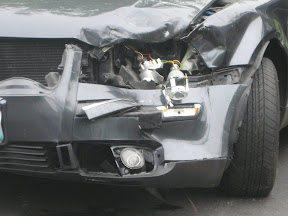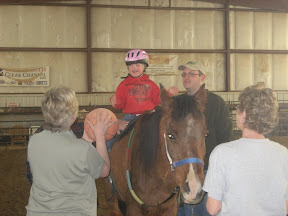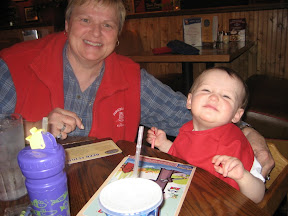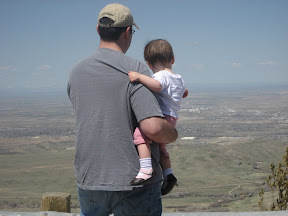I knew that I was expecting a baby with Down syndrome, and the news got around. Pretty soon, I started getting recommendations. A coworker I barely knew has a son with the same diagnoses Ellie has, and she stopped by my office with a lot of great information (and support) including the name of her son's fabulous pediatrician and his inclusive daycare, complete with great therapists. The special OB who performed my prenatal testing set me up with a terrific pediatric cardiologist who did a couple of fetal echocardiograms. Fetal. Like, before Ellie was even born. And then I had 20 weeks to grieve for what I imagined I'd lost, and to prepare for my daughter's birth.
When Ellie was born, I was so far ahead of where most women are after giving birth to a baby with trisomy 21.
And I loved my baby. I loved her so much, I hardly ever put her down. We had no problems nursing; we had immediate, intense attachment. Also, my mom had given me a book of therapy exercises to do with young children with Down syndrome, which I did daily almost from the time we got home from the hospital.
But I was still paralyzed by fear and discomfort and desire not to have to negotiate this new world into which I was thrust. I could handle the medical stuff. But
First Steps and therapies? Nonononononono.
Many pediatricians deal mostly with typically developing children, but Ellie's amazing, wonderful, terrific, unbelievable pediatrician was so helpful. She made the first call for me. She followed up. She told me what to expect, what to ask for, what Ellie needed. I got it all.
And then, the system changed. After our new "Pro-Life" governor was convinced that he really didn't want to
eliminate the First Steps program after all (start at the bottom) he still decided to cut it way back.
He instituted fees for some of the services, and a whole new model for determining what services are provided to our state's most vulnerable children.
When Ellie was 4 months old, she had an OT and a PT. By the time she was 12 months old, she'd added a developmental therapist and a speech path. A woman I know had a baby with Down syndrome two years after Ellie was born, and by the time her baby was 9 months old, she was receiving zero services. Nothing. Nada.
Because now, instead of working with the parent to determine the baby's needs based on diagnosis, pediatrician's recommendation, evaluation, or even a simple questionnaire, it's all based on one question: what are your concerns?
When the stunned new parent of a baby with any sort of special need finally works up the nerve to call the organization that's supposed to help her child, she's presented with this:
How are things going; do you have any current concerns?
It's a newborn baby! With an unexpected diagnosis! What is the parent supposed to say to this?!
She's not walking properly yet, being a newborn and all. Perhaps she should have physical therapy?As the parent, I am the expert on my baby. I'm the expert on her day-to-day needs, and on loving her. BUT, I'm not an expert on all babies. I'm not an expert on PT, OT, development, medicine, or speech. I need to be able to rely on a team of experts who will tell me what my baby needs.
But we withhold this information, tying the hands of the providers lest they offer more services than the parent knows to ask for, costing the state money (in the short term). Yet we want women to choose not to have abortions?
No Child Left Behind has made sure that public education continues this ugly trend.
The goals on a student's
IEP (individualized educational plan) drive what therapies she receives and what her therapists address with her. But the goals are derived directly from the "Family Concerns" section of the IEP. We messed up last year and didn't write down enough parent concerns and are currently having to supplement Ellie's therapies in all areas.
Tomorrow is Ellie's IEP meeting for next year, and I've been preparing for weeks. I've taken a training class and I have a better idea of what to ask for, and how.
But it shouldn't be this hard for parents. The experts should be able to help us determine what Ellie needs, and what it's realistic to ask of her.
Because, you know what? I'm more equipped to deal with this situation than a lot of other parents. What does it mean for their children? And what does it mean for our society when these children leave school and are expected to become productive adults?














